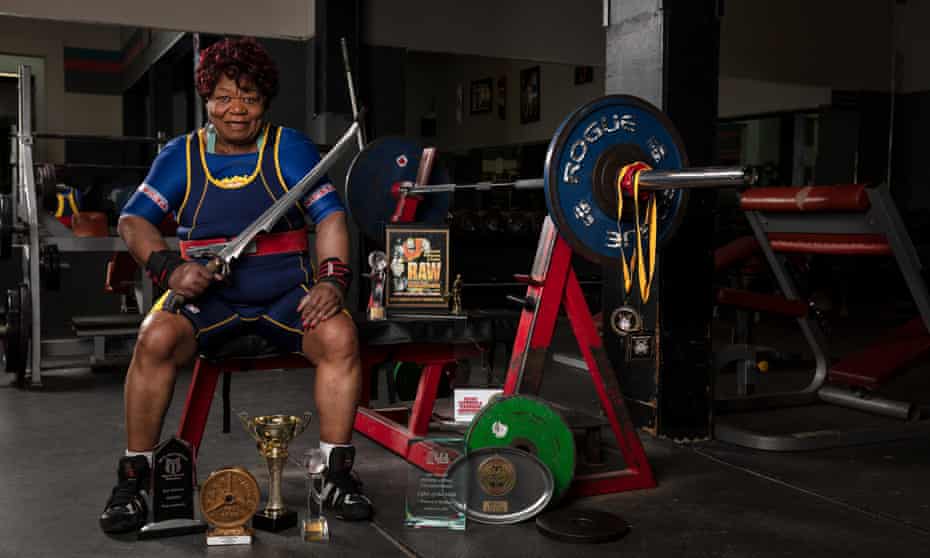Experience: I’m a 79-year-old world champion powerlifter
People look at me and say, ‘She won’t be able to lift that.’ I like surprising them

I started powerlifting when I was 65. I worked in real estate in Michigan for about 35 years, and when I retired I decided I wanted to lose a bit of weight. A friend’s husband, Art Little, who is a personal trainer, invited me to his gym. He introduced me to powerlifting and is still my trainer now.
The first time I went, he gave me a broomstick to lift. The next day I told myself I wouldn’t return, but I heard a voice in my head telling me to go back. So, I ended up returning day after day. After a few weeks, my trainer encouraged me to go to a tournament to watch others compete. I was really amazed by all these young women, but there was no one of my age. I asked my trainer if he thought I could do it and he said, “Oh, sure.”
The first time I competed was at a state meet. There were about 45 people across the different age groups, which ranged from teenagers to people my age. There were only three of us in my age category. I did the bench press, the deadlift and the squat – the three types of lifts in powerlifting – and came first in all three. I was amazed that I won, because the others had been doing it far longer. I just came in after two months and wiped them all out. After that, I knew powerlifting was for me.
My trainer had me going to the gym three times a week. I improved so quickly because I was consistent. If I was supposed to be there on Monday, I would be there, regardless of whether it was a holiday, raining or snowing. I didn’t miss a day – and that’s how I’m up to the weight I’m lifting now, although the gains happened slowly. Each year, I was getting better.
When I began powerlifting, I could bench press about 36-41kg, but now it’s 91kg. My top squat is 188kg and my deadlift has increased from about 36kg to 188kg. I’m the world record-holder in all three in the 60-plus age category.
I didn’t do any sports when I was younger; I was lazy. By the time I was in my 60s, I felt constantly tired and I’d get out of breath walking up and down stairs when I was showing homes as an estate agent. It was embarrassing. Now, the doctor tells me my heart is strong and healthy.
My father was a workaholic. He was employed in a steel factory and passed his work ethic down to me. He instilled in me the idea that you have to be consistent and set your mind to things to get anywhere in life. I still train three days a week, with each session lasting one to three hours. Each day is dedicated to one of three powerlifting disciplines. I also do a lot of varied workouts in the gym to get my body ready for a tournament, such as leg presses, squats and pull-downs.
READ RELATED: The Exercise You Don't Want to Skip on Leg Day
Working out can be challenging sometimes, but whenever I get home afterwards, I feel great. My trainer is really proud of me. I’ve been invited to take part in the world championships every year since I started powerlifting and I’ve won in my category every time. The younger competitors tell me they want to be like me when they get to my age. Judges have been shocked by how much I can lift. People often look at me and say, “Oh, she won’t be able to lift that.” I like surprising them.
It can be expensive, though – there’s a lot of travel involved, and a piece of specialist kit, such as a squat suit, costs between $200 and $500 (£243-£404). I supplement my income doing food deliveries.
I’m 79 now and I tell people who are my age that they can do this, too; they just have to be consistent and start with something small. You have to build yourself up. If not powerlifting, then do something active. You have to move your body. If you sit down and do nothing, you turn to dust.
When I’m out and about, neighbours will ask me if I’m the lady who powerlifts. My daughter is a nurse and her colleagues ask if she powerlifts, too. She doesn’t, but is proud of me. My son loves that I do it. His friends say he should be in the gym and he tells them it’s his mama’s thing. I can lift more than he can.
My goal is to do 454kg (1,000lb) total across the three disciplines by the time I go to the world championships in November. Though my biggest achievement is improving my health. As long as I keep my good health and a strong mind, that’s all I care about.
As told to Amy Sedghi
Do you have an experience to share? Email [email protected]
Source: Health & wellbeing | The Guardian




